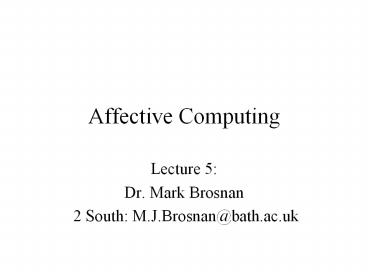Affective Computing - PowerPoint PPT Presentation
Title:
Affective Computing
Description:
Affective Computing: Computing that relates to, arises ... Elliot searches unlimited search space to make a rational decision ... Sci Fi: 2001! Design questions ... – PowerPoint PPT presentation
Number of Views:213
Avg rating:3.0/5.0
Title: Affective Computing
1
Affective Computing
- Lecture 5
- Dr. Mark Brosnan
- 2 South M.J.Brosnan_at_bath.ac.uk
2
Picard (1997)
- Affective Computing Computing that relates to,
arises from, or deliberately influences emotions
(p.3) - Recognise emotions
- Express emotions
- Have emotions
3
(No Transcript)
4
Is Mr. Spock intelligent?
- Spock is only rational
- Descartes Error (Damasio, 1994)
- Elliot searches unlimited search space to make a
rational decision - Missing somatic markers that associate feelings
with decisions
5
Artificial Intelligence?
- AI is like Elliot
- Turing Test (1950 French 2000)
- Jabberwacky.com
- Emotion is required for artificial intelligence
(Hofstadter, 1981) - Emotional Intelligence?
6
Affective communication
- Social rules extended to computers
- Media Equation (Reeves and Nass, 1996)
- Anthropomorphism
- Mechanomorphism
7
Recognise Emotions
- Vision to recognise facial expression
- Multimodal
- GSR polygraph
- Which emotion happiness, guilt
- Emotional Turing test
- Person dependent
- Person independent
8
Criteria for recognition
- Input
- Pattern recognition
- Reasoning
- Learning
- Bias
- Output
9
Express emotions
- Kismet (Breazeal and Scassellati, 2002)
- Emotional expression for communication and social
co-ordination - Emotion for organisation of behaviour (action
selection, attention and learning) - Arbib and Fellous (2004)
10
http//www.ai.mit.edu/projects/humanoid-robotics-g
roup/ kismet/kismet.html
11
(No Transcript)
12
(No Transcript)
13
(No Transcript)
14
- More effective expression than humans
- Human expression identified 50 of the time
- Computer expression identified 70 of the time
- (Elliott, 1997)
- Computers having non-human emotion?
15
Criteria for expression
- Input
- Intentional vs. spontaneous pathways
- Feedback
- Bias exclusion
- Social display rules
- Output
16
Have emotions
- Can machines feel?
- How would we know?
17
Criteria for having emotions
- System has behaviour that appears to arise from
emotions - System has fast primary emotional responses to
certain inputs - System can cognitively generate emotions
- System can have emotional experience
- Systems emotions interact with other processes
(e.g. memory)
18
Do computers need bodies to have emotions?
- Robot emotions? Arbib (2005)
- Recognition of own emotion
- Recognition of other computers emotions
- Consciousness?
- Real or simulation?
- Sci Fi 2001!
19
Design questions
- 1. Should computers be allowed to keep their
emotions from their designers? - 2. Should what is considered good and bad be
hard-wired or learned? - 3. Should a computers mood be affected by others
moods? - 4. Do computers need negative emotions, anger,
fear, misery?
20
Interacting with Computers
- Special Issue (2002, 14(2))
- Affective Computing
21
Scheirer et al. (2002)
- Frustration
- Slow computer game
- Mouse clicking behaviour
22
Klein and Picard (2002)
- This computer responds to user frustration
- Affect-support agent
- Text and buttons in a GUI
- Demonstrate empathy to support user
- Control 1 Emotions ignored
- Control 2 Vent frustration
23
Experiment
- Game 1
- Agent intervention
- Game 2
- Affect support agent lead to greater involvement
in longer play with Game 2
24
Picard and Klein (2002)
- Emotion skill needs
- Emotional self awareness
- Manage emotions
- Self-motivate
- Affect perception
- Empathy
- Experiential emotional needs
25
Hone (2006)
- Empathetic agents more effective
- Embodied
- Female embodied agents more effective
26
(No Transcript)
27
Tractinsky (2004)
- Affective HCI is difficult to study
- Affective HCI is hard to do
- Design interactive technologies that help users
help themselves
28
Muller (2004)
- 2 Criticisms
- Computers Are Social Actors (CASA)?
- Other technologies are anthropomorphised too
(boats, cars, toys etc) - Need to better understand emotions
29
Artefact
- Potential course work idea is to analyse the
affective nature of a piece of technology - Or to investigate agent mediation of affective
states - Or evaluate the impact of emoticons
- Frustrate users and see what happens!
30
References
- Journals
- Interacting with Computers
- Trends in Cognitive Sciences
- Both available on line
- Book
- Picard, R. (1997) Affective Computing. MIT Press.
31
In Future
- Develop an understanding of anxiety, specifically
computer-related anxiety - Develop an understanding of emotion and the
neuropsychology of HCI




























![Global Affective Computing Market : Company Profiles, Market Opportunities and Forecast [2015 – 2021] PowerPoint PPT Presentation](https://s3.amazonaws.com/images.powershow.com/8310227.th0.jpg?_=201512040612)


